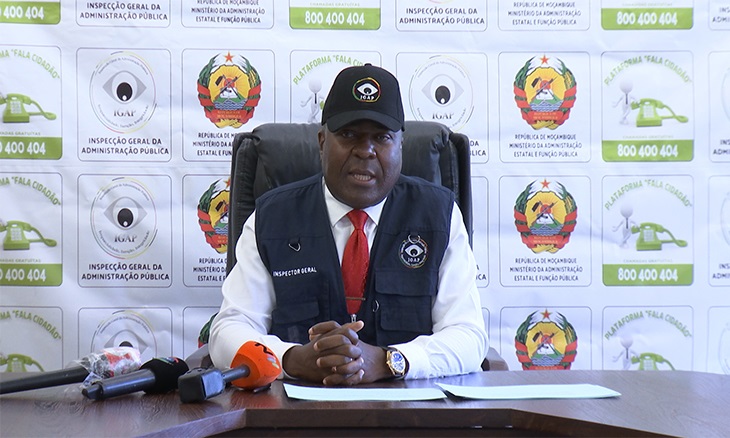Mozambique: Chiúre in panic following terrorist incursion - AIM report
Mozambique: Inspectors find serious abuses in public administration

Photo: O Páis
Mozambique’s General Inspectorate of the Public Administration (IGAP) has warned of serious abuses in the public service, including irregular payments, falsification of documents, and improper hiring of staff.
Speaking at a Thursday press conference in Maputo, the IGAP General Director, Augusto Mangove, summarising the work of his institution in the first six months of the year, said the worst abuses had been found in public institutes, foundations and funds where the rules for public tendering were not observed, and where members of their Boards of Directors remained in their posts, even though their terms of office had expired.
Worse still, most of the institutes had not set up supervisory boards, which are the bodies that are supposed to guarantee internal control.
Mangove added that his team had found enormous disparities between public institutions in the monthly wages paid to their officials. Some of these bodies paid the chairpersons of their boards around 500,000 meticais (about 7,870 US dollars, at current exchange rates), while others, with exactly the same classification, were paid only 150,000 dollars a month.
“There is no uniformity in wages, but we have given a deadline for this situation to be corrected”, he said.
There were also cases where senior officials were paid twice. This duplication of wages was reported, for example, among doctors at the Jose Macamo hospital in Maputo, and in the education sector in Tete province.
In inspections of government ministries, said Mangove, “we found that most of them do not have a plan for the development of their human resources. We also have institutions that do not have green lines, where the public can phone in complaints”.
IGAP writes a report for each of its inspections and sends it to the institution concerned, which has 30 days in which to reply. When serious violations are discovered, disciplinary and/or criminal proceedings should be started against those involved.
The most serious cases are referred to the Central Office for the Fight against Corruption (GCCC).
Mangove said that in the first half of the year 23 ordinary and extraordinary inspections were held of ministries and other public institutions. The extraordinary inspections, he said, are those that result from complaints or from whistle blowers denouncing irregularities.
“Public servants should be guided by ethical principles and should refrain from corrupt practices”, he added, “since we shall be extremely tough against corrupt officials”.
He noted there had been improvements in some institutions, such as a reduction in waiting times, and the use of electronic platforms to a schedule appointments for members of the public.












Leave a Reply
Be the First to Comment!
You must be logged in to post a comment.
You must be logged in to post a comment.